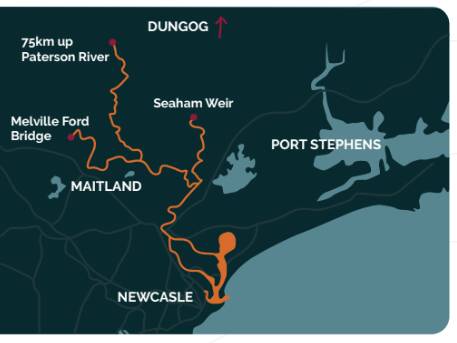
A toxic cocktail of industrial contamination has resulted in the Hunter Estuary receiving one of the state's worst water quality report cards.
The grim prognosis is detailed in the recently completed Hunter Estuary Coastal Management Program scoping study, which is supported by Newcastle, Maitland, Port Stephens Dungog and Cessnock councils.
The study seeks to chart a path forward for the estuary's recovery and future management.
It cites a Department of Planning and Environment water quality monitoring program that assessed the Hunter River as having poor water quality.
In addition, it notes that the lower part of the Hunter Estuary is ranked 124 out of 160, while the upper estuary is regarded as having the state's worst water quality.
"Contamination by industrial chemicals is a long-standing feature of the lower Hunter estuary," the report says.
"Multiple legacy sources occur around the Port of Newcastle. Risks from contamination in a section of the south arm of the estuary have been reduced through an extensive dredging and remediation project."

The report also highlights the impact of Per and Poly
Fluoroalkyl Substances (PFAS) on the Hunter River and connected wetlands.
"This group of manufactured chemicals was used, until recently, in firefighting foams at the Williamtown RAAF Base. It has also been used at other industrial sites around the estuary,' the report says.
"The impact of these substances on the Hunter Estuary is still under investigation and will need to be considered in future management actions."
Newcastle Deputy Lord Mayor Declan Clausen said a review of the estuary's governance structures was urgently needed.
"The report findings are alarming - it is disturbing to read how poor a condition the Hunter River Estuary is in, ranking 160th of 160 NSW Estuaries, with the worst water quality in the state.
"Fixing this is beyond the means of local government alone.

"City of Newcastle provides $4.2 million in annual funding to the NSW Government via the Hunter Catchment Contribution Levy.
"An overview of the governance structures is urgently needed, to ensure clear coordination, oversight and accountability for the ecological and economic health of the Estuary.
Councillor Elizabeth Adamczyk said intervention was urgently needed to preserve the estuary's internationally recognised wetlands.
"The Hunter River Estuary is of national and international significance, home to the RAMSAR-listed Hunter Wetlands National Park," she said.
"We need a plan to focus on fixing the runoff and licensed industrial discharges that are placing stress on the ecosystem."
To see more stories and read today's paper download the Newcastle Herald news app here.







